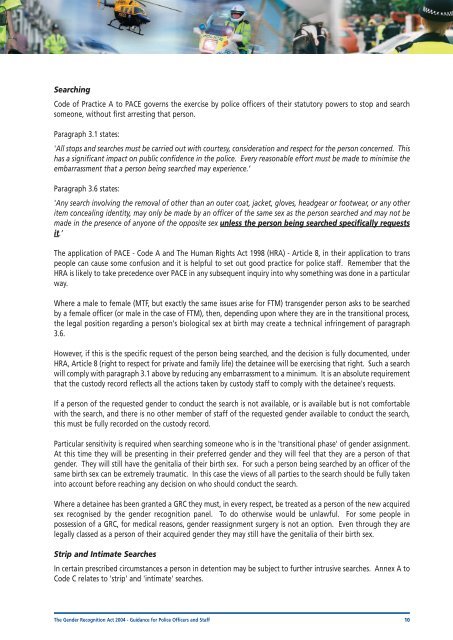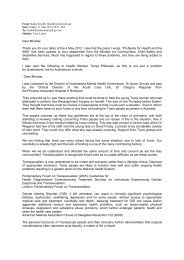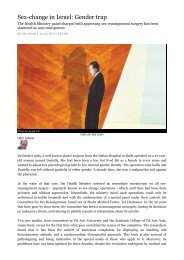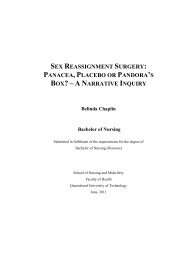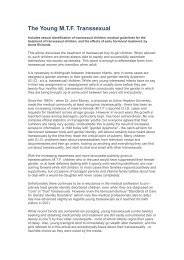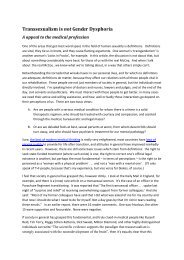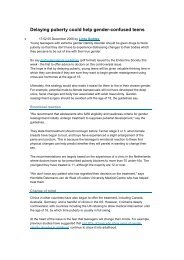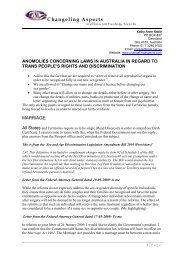The Gender Recognition Act 2004 Guidance for Police Officers and ...
The Gender Recognition Act 2004 Guidance for Police Officers and ...
The Gender Recognition Act 2004 Guidance for Police Officers and ...
- No tags were found...
Create successful ePaper yourself
Turn your PDF publications into a flip-book with our unique Google optimized e-Paper software.
SearchingCode of Practice A to PACE governs the exercise by police officers of their statutory powers to stop <strong>and</strong> searchsomeone, without first arresting that person.Paragraph 3.1 states:'All stops <strong>and</strong> searches must be carried out with courtesy, consideration <strong>and</strong> respect <strong>for</strong> the person concerned. Thishas a significant impact on public confidence in the police. Every reasonable ef<strong>for</strong>t must be made to minimise theembarrassment that a person being searched may experience.’Paragraph 3.6 states:'Any search involving the removal of other than an outer coat, jacket, gloves, headgear or footwear, or any otheritem concealing identity, may only be made by an officer of the same sex as the person searched <strong>and</strong> may not bemade in the presence of anyone of the opposite sex unless the person being searched specifically requestsit.’<strong>The</strong> application of PACE - Code A <strong>and</strong> <strong>The</strong> Human Rights <strong>Act</strong> 1998 (HRA) - Article 8, in their application to transpeople can cause some confusion <strong>and</strong> it is helpful to set out good practice <strong>for</strong> police staff. Remember that theHRA is likely to take precedence over PACE in any subsequent inquiry into why something was done in a particularway.Where a male to female (MTF, but exactly the same issues arise <strong>for</strong> FTM) transgender person asks to be searchedby a female officer (or male in the case of FTM), then, depending upon where they are in the transitional process,the legal position regarding a person's biological sex at birth may create a technical infringement of paragraph3.6.However, if this is the specific request of the person being searched, <strong>and</strong> the decision is fully documented, underHRA, Article 8 (right to respect <strong>for</strong> private <strong>and</strong> family life) the detainee will be exercising that right. Such a searchwill comply with paragraph 3.1 above by reducing any embarrassment to a minimum. It is an absolute requirementthat the custody record reflects all the actions taken by custody staff to comply with the detainee's requests.If a person of the requested gender to conduct the search is not available, or is available but is not com<strong>for</strong>tablewith the search, <strong>and</strong> there is no other member of staff of the requested gender available to conduct the search,this must be fully recorded on the custody record.Particular sensitivity is required when searching someone who is in the 'transitional phase' of gender assignment.At this time they will be presenting in their preferred gender <strong>and</strong> they will feel that they are a person of thatgender. <strong>The</strong>y will still have the genitalia of their birth sex. For such a person being searched by an officer of thesame birth sex can be extremely traumatic. In this case the views of all parties to the search should be fully takeninto account be<strong>for</strong>e reaching any decision on who should conduct the search.Where a detainee has been granted a GRC they must, in every respect, be treated as a person of the new acquiredsex recognised by the gender recognition panel. To do otherwise would be unlawful. For some people inpossession of a GRC, <strong>for</strong> medical reasons, gender reassignment surgery is not an option. Even through they arelegally classed as a person of their acquired gender they may still have the genitalia of their birth sex.Strip <strong>and</strong> Intimate SearchesIn certain prescribed circumstances a person in detention may be subject to further intrusive searches. Annex A toCode C relates to 'strip' <strong>and</strong> 'intimate' searches.<strong>The</strong> <strong>Gender</strong> <strong>Recognition</strong> <strong>Act</strong> <strong>2004</strong> - <strong>Guidance</strong> <strong>for</strong> <strong>Police</strong> <strong>Officers</strong> <strong>and</strong> Staff10


